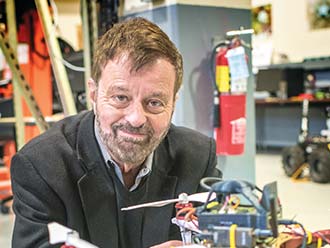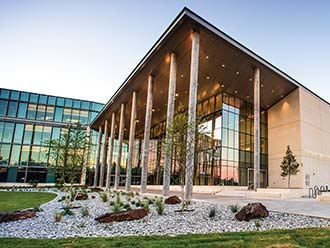UTA offers myriad free resources for budding entrepreneurs. These include the StartUp Lounge; the EpICMavs interactive entrepreneurship seminar series; TechFW@UTA, where innovators learn how to commercialize their inventions; and numerous other services that complement classroom experiences, such as writing a business plan that comes with the opportunity to win thousands of dollars in funding. Through it all, students learn from professors who are entrepreneurs themselves.
The most resounding evidence of UTA’s championing of entrepreneurs are the many success stories of faculty, students, and alumni who have established or are in the middle of building their businesses.
TRUSTING IN THE STUDENTS
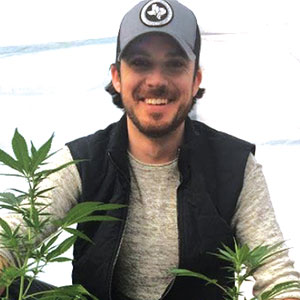 Tyler Sickels
Tyler Sickels
Tyler Sickels (’18 BA, Philosophy), the CEO of SolGro, started his business as a student in Wei Chen’s laboratory. Sickels says that Dr. Chen, physics professor and the director of the Center for Security Advances Via Applied Nanotechnology, took him seriously as someone who could help commercialize plantgrowing technology developed in the lab, even though he was a student at the time.
Sickels worked with UTA’s Office of Technology Management to research whether the new greenhouse technology would be financially viable as a business. With the advice and assistance of the tech transfer staff, Sickels decided how to commercialize the technology. After launching in March 2017 with Sickels’ first investor dollars, SolGro won UTA’s Innovation Day Competition and was named to the short list of the National Council of Entrepreneurial Tech Transfer’s top university startups for 2017.
“Some of the challenges we face as minorities—women and also African-Americans—there aren’t a lot of mentors to guide you. We found a safe place at UTA with the MavsChallenge and the StartUp Lounge.”
Sickels and his team are now working to bring the technology from the University to the marketplace.
“So far the hardest thing has been scaling the production,” Sickels says. “Taking it from the lab scale in small beakers, to be able to produce kilograms instead of grams. That’s the next step.”
As SolGro ramps up, Sickels says he’s applying lessons from his Innovation, Creativity, and Entrepreneurship class. In particular, the lessons about failed companies and the mistakes they made have helped him avoid the same missteps so far.
DOWN BUT NOT OUT
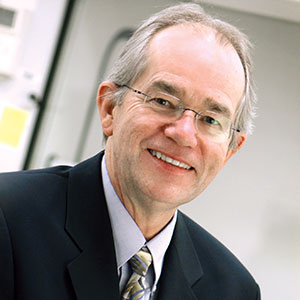 Robert Magnusson
Robert Magnusson
Failures are often the best teachers, and UTA professors are quick to share their hardest lessons-learned so their students don’t make the same missteps. An error Robert Magnusson, professor of electrical engineering and the UTA Texas Instruments Distinguished University Chair in Nanoelectronics, tells his students about is a time, years ago, when one of his ideas was stolen: Another company filed a patent on his idea within six weeks of hearing his presentation.
“I teach my students about all those things,” says Dr. Magnusson, cofounder and chief technical officer of Resonant Sensors, a company that provides nextgeneration optical sensor systems for pharmaceutical and biotech customers. Cofounder and UTA alumna Debra Wawro Weidanz serves as CEO and chief scientist. “I’m bruised and scarred, and they see that. I want to help them avoid the mistakes I made when I became an entrepreneur.”
Magnusson, who teaches a course on engineering entrepreneurship, says entrepreneurship in the engineering and technology realm differs from other types of business-building. For example, he talks about the level of investor funds necessary to get started, which could be in the millions, and government grants, building prototypes, and of course, patents and intellectual property. (Students can get additional help with patenting and licensing in UTA’s Office of Technology Management.)
In his class, Magnusson has students pair up and create a business plan to pitch to venture capitalists. Students get to experience both sides of entrepreneurship—simulating the role of the investors, too, by grading their classmates on the quality of their presentations.
AFFIRMATION FROM ALL SIDES
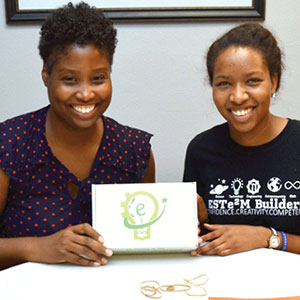 Latasha Taylor Starr and Ariel Bowman
Latasha Taylor Starr and Ariel Bowman
UTA’s MavsChallenge is a Universitywide Shark Tank-style competition in which students of any major are invited to pitch their entrepreneurial business ideas in hopes of winning a $10,000 grand prize.
As second-place winners in the 2018 MavsChallenge, Latasha Taylor Starr, an industrial, systems, and manufacturing engineering doctoral student, and Ariel Bowman, a mathematics doctoral student, received $2,000 to put toward the creation of their business, ESTe²M Builders.
The company is a multipronged educational program that focuses on building confidence, competence, and creativity in students as young as 3 years old in science, technology, engineering, entrepreneurship, and mathematics. They want to help children develop entrepreneurial skills they can use in STEM fields.
“I’m building something worth having.”
Caleb Geer
Starr and Bowman viewed the MavsChallenge prize as confirmation that their idea was financially viable, and they’ve received validation in many forms—including sales, of course—since they started developing their business idea in January 2018. Starr, for example, was inducted into the Texas Business Hall of Fame scholarship program.
“One of the challenges we face as minorities—women and also African-Americans—is that there aren’t a lot of mentors to guide you,” Starr says. “We found a safe place at UTA with the MavsChallenge and the StartUp Lounge.”
The two have been thankful for the endless support of UTA professors, particularly Jeffrey McGee, associate professor and the faculty adviser of the Entrepreneur Society, a student organization that offers networking and leadership opportunities along with a speaker series so students can hear directly from successful entrepreneurs.
BACKING THE ENTIRE UTA COMMUNITY
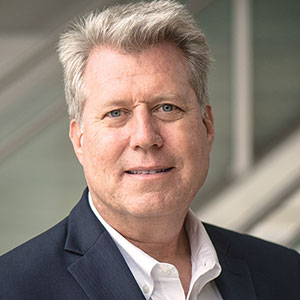 Jon Weidanz
Jon Weidanz
UTA also supports entrepreneurial professors with resources and facilities that some businesses might otherwise find difficult to obtain. Jon Weidanz, associate vice president for research and chief scientific officer of Abexxa Biologics, says the company’s relationship with the University is a win-win. While the biotech company gets to lease equipment and space from the University, Abexxa enhances UTA’s brand as a school that encourages faculty members to start their own businesses.
Students also have internship opportunities at Abexxa, which is working to identify new biomarkers for cancer to improve immunotherapy options. The company was named one of the 40 Best University Startups of 2017 by the National Council of Entrepreneurial Tech Transfer.
“I have students in my company gaining experience working in a company setting, which is different from an academic lab,” says Dr. Weidanz, who cofounded Abexxa with his wife, Debra Wawro Weidanz. “They’re focused on how to deliver goods and how to work together to get a molecule to do X‑Y‑Z.”
GIVE ’EM WHAT THEY WANT
Alumnus and UTA lecturer Lee Thurburn (’82 BBA, ’92 MBA) brings 25 years of entrepreneurial experience to the classroom. Even though classes dedicated to entrepreneurship didn’t exist at UTA when he was there, Thurburn used his business skillset to venture out on his own. Some of his businesses failed; some succeeded; some he just didn’t enjoy, so he moved on. Now the president of the online marketing automation system Apricot Rocket, Thurburn brings all those lessons to his lectures with the hope that students will use them as they forge their own paths.
Thurburn says the biggest lesson he shares with students is focusing on giving customers what they want rather than what they need. To illustrate the point: In 1995, he offered dialup and marketing services to real estate agents for the newborn internet, long before Realtor.com existed. Despite what he saw as the obvious benefit of publishing the entire real estate database online, he struggled to make sales.
“We were selling what agents needed, but they didn’t want it,” Thurburn says of his then-business, Flash.Net. “They were used to hardcopy MLS books, and the internet was complicated. They didn’t want to change.”
At the same time, Thurburn let five retailers give Flash.Net floppy disks to customers buying new computers, offering a free month of the company’s services. That plan, he says, was a winner, a lesson he emphasizes to his students.
“No one needed internet, but they wanted it,” he says. “We sold 50 accounts to people who needed it and didn’t want it, and we sold 200 accounts to people who wanted it, but didn’t need it. If we had continued to sell what people needed, we would have failed.”
MEASUREMENTS OF SUCCESS
Andrew Feghali (’12 BA, Mechanical Engineering; ’16 MBA) had always wanted to run his own company, and after earning an engineering degree and his MBA, he founded Aeroblaze Laboratory, a company that conducts fire testing for aircraft materials. He said the critical-thinking skills he learned as an engineering undergrad have helped him think creatively to find solutions to business problems.
“If you asked me two years ago versus now, my definition of success is different now,” Feghali says. “Bringing in the first customer took two months. That doesn’t seem like that long, but when you’re in it and you don’t know when it’s going to come, that was the worst two months of my life.”
A $1.5 MILLION GIVING BOOST
Thanks to a generous gift from an anonymous donor, UTA is proud to announce the Maverick Entrepreneur Program and Award Fund, which encourages and supports entrepreneurs and innovation projects at UTA. The program includes a course on entrepreneurship and business management principles, which allows up to 20 students the opportunity to complete a business plan and prepare presentations on their ideas.
At the conclusion of the course, competitions provide students the chance to receive funding to further develop and execute their business ideas.
Since then, he’s had many customers and many milestones. After that first customer, Feghali says the next success marker was the first month he broke even on expenses. Then he hired a parttime employee, mechanical engineer Leslie Gardner, who graduated from UTA in 1999. Now about 3 years old, Aeroblaze is consistently in the black.
“My dad always said I couldn’t make a living lighting things on fire,” Feghali says, “but I proved him wrong.”
Caleb Geer (’18 BS, University Studies), owner of Urban Tree Merchants, is currently where Feghali was several years ago—waiting for his business to take off. After working with his entrepreneurial father at the family’s tree company, Geer decided he wanted to run a business of his own, creating luxury custom furniture made from salvaged trees.
He says Thurburn was instrumental in his success so far, giving practical advice in class and also helping him narrow his purpose outside of class. Since then, Geer built his own mill, made some big sales, and in less than two years, has hired an employee to do woodworking while he focuses on the business side.
Now that he has graduated, Geer can dedicate all his time to the company, but he says being a small-business owner has taught him the value of patience, especially in his industry.
“With the wood, I have to play the long game because wood has to dry,” he says. “Wood is like wine; they’re things that have to sit for a while before they’re useful. But I’m not in a rush. I’m building something worth having.”


